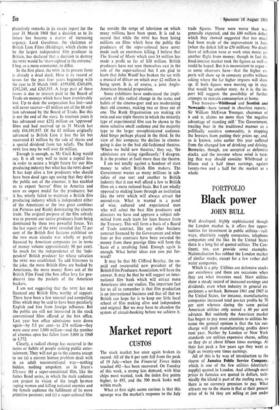Black power
PORTFOLIO JOHN BULL
Well developed, highly sophisticated though the London market is, it offers few oppor- tunities for investment in public utilities—rail- ways, electricity supply companies, telephone companies and the like. In the United States there is a long list of quoted utilities. The Con- tinent, too, can provide some examples. Nationalisation has robbed the London market of similar stocks, except for a few rather dull water companies.
Which is a pity. Utilities are defensive stocks par excellence and there are occasions when they are what investors need. Most utilities show a steady record of increased earnings and dividends, even when industry in general ex- periences a set-back. Between 1961 and 1967 in the United States, for instance, manufacturing companies increased total pre-tax profits by 70 per cent whereas during the same period American utilities only scored a 40 per cent advance. But suddenly the American market has begun to pay more attention to utilities be- cause the general opinion is that the tax sur- charge will push manufacturing profits down next year. Neither by London or New York standards are utilities expensive shares, selling as they do at about fifteen times earnings. At their last peak a few years ago they went as high as twenty-one times earnings.
All of this is by way of introduction to the shares of Jamaica Public Service Company, which is one of the few utilities (electricity supply) quoted in London. And although most prices in Jamaica are quoted in dollars, tech- nically the island is part of the sterling area, so there is no currency premium to pay. What attracts me to the shares is that at their present price of 6s 9d they are selling at just under
eight times earnings and providing a gross divi- dend yield of 6.8 per cent. Of course I do not expect a utility on a small, independent island in the Caribbean to sell at a price comparable to the best American utilities. My point is that the present margin is too large, and that because of (a) the quotation of the shares on the Mon- treal as well as the London market (b) the in- creasing interest of American investors in utili- ties (c) the increasing numbers of Americans who take their holidays in Jamaica and see for themselves what political risks are entailed, the shares could move ahead.
But before making up one's mind, there are three areas of inquiry which have to be checked out. What is the company's record? What do its commercial prospects look like? What exactly are the political risks? In the past fifteen years net income has fallen rather than risen on only two occasions. The figures for the last four years are £634,000, £641,000, £838,000 and in 1967 £1,034,000. Dividends, too, have risen, though from plateau to plateau rather than steadily.
Prospects? The immediate problem is some delay on the commissioning of new plant, but as a monopoly supplier of electric power on an island whose national product is growing at 5 per cent plus per annum (in good years much more), it is difficult to see why the earnings trend already established should be dented.
Political risks? Political control is firmly in the hands of the coloured majority on the island. The Prime Minister and the Governor- General are both coloured. It is said that economic power is firmly held by the white minority, and that the two sides are, for the time being at least, content with the bargain. In any case there is Jamaica's desperate need for foreign capital, which explains her excep- tionally favourable treatment of foreign in- vestors, who are provided with tax-free holi- days and unlimited repatriation facilities. I have spoken to a wide range of British and American businessmen with interests in the island or plans to invest money there. I detect no worry about the political future. I have, therefore, bought 1,000 of the shares at 6s 9d for my first portfolio. For investors paying tax at the standard rate, the effective dividend yield on the shares is 5f per cent.
Valuation a: 14 August 1968 First portfolio 100 Empire Stores at 73s .. f365 50 Phoenix Assurance at 187s 6d £469 225 Lyle Shipping at 22s 9d .. £256 100 Unilever at 83s 3d £416 £2,000 War Loan at £47 7/16 .. £949 300 Witan at 23s 3d £349 50 E. Scragg at 137s. 6d .. f344 50 Barclays Bank at 86s 6d £216 200 Throgmorton Secured Growth (Capital) at 18s 7fd £186 100 National and Grindlays Bank at 66s 9d xd £334 500 Clarkson (Engineers) at 15s 6d .. £387
60 Rio Tinto Zinc at 145s 6d .. f436 1,000 Associated British Foods at 12s 9d £637 1,000 Jamaica Public. Service at 6s 9d £337 Cash with local authority at 71 per cent £982
f6,663
Deduct: expenses £150
Total f6,513 Second portfolio: total £5,309 (details next week).



































 Previous page
Previous page